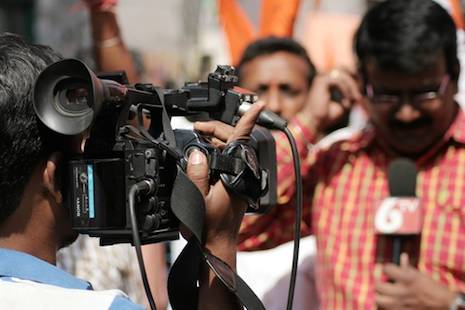Before the elections eve until 25th July, the amount of hatred and venom which permeated through television shows and political reporting of Indian media about Imran Khan contravened all the limits of journalistic constitution and character. The elements of propaganda, deceit, sensationalization and partiality were conspicuous and Khan did complain, in his victory speech, about Indian media’s dubious role in efforts to portray him as a symbol of villainy. An institution whose role is to uphold public sphere for a healthy argument and open debate got itself indulged in releasing judgmental statements, cynical criticism, over-cooked reporting in tune with excessively dramatic sounds and ostensibly bogus and falsely-oriented journalism. PTI’s manifesto, which was released at peak of PTI’s run up to elections included anti-graft strategy, human development, improved infrastructure, flawless police system, employment opportunities and enhanced economic order. And, of course, none of these crucial point, central to PTI’s future discourse of action if voted to rule, received any mention, not even slightest of it. Perhaps, it was not as imperative as it was to show Khan as “anti-India”, “pro-Hafiz Saeed”, “Army stooge” or “boot-licker”-- for media ratings and TRPs.
In his victory speech after recent election, Khan hinted on bolstering ties with India by asserting that Pakistan under him is all down to walk two steps if India takes one. Alongside, he also made mention of gross human rights violations occurring in IHK. He furthered his intentions by saying that, instead of Pakistan blaming India for conflict in Balochistan and India blaming Pakistan for spoon-feeding insurgency in IHK, it will be more effective if both governments initiate to share common table of peace talks and process of civic negotiations. Given the fact that Khan is untested and untried unlike Nawaz Sharif, this was the most balanced and reasoned assertion about checkered Pakistan-India relations that any sane citizen on both side of borders would have expected from Imran Khan.
Now, let’s look into the statements and reporting of some of India’s leading journalists, seasoned television analysts and political pundits, which they gave on future prospects of Indo-Pak relations after Khan will take oath on 18th August. In a show on India today when the anchor inquired about--Khan’s intentions of playing friendly with closely acquainted India--from the a seasoned political analyst named “Ambassador Dogra”, he replied angrily saying that, “If he was really sincere, he should have placed India before all the other countries while talking vis-à-vis relations with neighbours”. In other words, for him: the single absurdist most rationale to be cynical about Khan was mere because he mentioned about relations with Afghanistan and China first and then India. Later, he went on saying that Khan’s speech was filled with negatives and ifs and buts, which clearly and ostensibly is not the case. Another commentator in the same show said that the reason behind Khan’s announcement to not use Prime Ministerial office is because PM house is dump and trash as compared to Khan’s “luxurious” living at Bani Gala, Islamabad.
India was ranked 136 out 180 in latest index, released by an NGO, Reporters without Borders—one of the least ranked countries in the world below countries even like Afghanistan and Palestine. India is politically and socially polarized more than ever and one of the leading reasons is its journalism and the way it is conducted which best suits to create divisions and distortions. If not controlled, such kind of journalism becomes consequential with grave repercussions and jeopardy.
Indian media tried to entrench this idea that the whole general election in Pakistan was built on a narrative backed by anti-India rhetoric used by all parties and not just Khan’s party. Be it PML-N, PPP or PTI, all were manipulating anti-India rhetoric to grab power seat. Reality is about the fact that the PML-N and PPP went on selling out their infrastructure promises and PTI relied on anti-corruption crusade tactics. Bilateral ties with India were literally one of the least talked about topics during campaign process. Ironically and funnily, Hafiz Saeed and other ultra-conservative parties, who gained popular grounds by selling anti-India mantra miserably lost.
Around a month past, one of my Indian friends, who is majoring in Politics and Journalism with me at University of Calgary, told me an interesting fact about mass media culture prevalent in India. He said, “Indian people are crazy about three things: Bollywood, Cricket and the way media makes mountain out of molehill.” Seeing the headliners, where it was being portrayed as if Khan’s sole reason to come into power is to vanish India off the planet, I realised, perhaps, he was aptly right in pointing out India’s nasty business of media. It has largely resorted to merchandise and commodification devoid of any desire to create content that could lay foundation for intellectual engagement.






